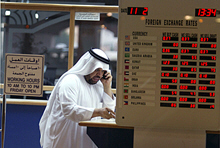
Typical street scene in Santa Ana, El Salvador. (Photo: iStock)
IMF Survey: Tracking Financial Globalization
July 2, 2007
The growing integration of the world economy—one of the main features of globalization—is increasingly affecting the policy choices of the IMF's 185 member countries.

Focus of the compilation is on financial globalization, including policy implications of surge in cross-border capital flows (photo: Joe Raedle/Getty)
F&D compilation
For this reason, the IMF's quarterly magazine, Finance & Development, has been tracking the trends and consequences of globalization, which refers to the growing speed and ease with which goods, services, factors of production, ownership of assets, information, ideas, and people move across national borders.
The 24 articles in this collection, Financial Globalization: The Impact on Trade, Policy, Labor, and Capital Flows, were compiled from issues of Finance & Development over the past eight years. They examine the economic implications of and responses to globalization in an era when porous borders limit the domestic effectiveness of many national decisions while causing their effects to be transmitted internationally. The focus is on financial globalization, including the policy implications of the surge in cross-border capital flows, which have tripled to $6.4 trillion since 1995.
Should the surge in capital flowing around the world be cause for joy or for alarm? Alarm seemed to dominate in the aftermath of the East Asian financial crisis of the late 1990s. But the costs and benefits of these global flows are being reappraised, and many developing countries are grappling with the decision of whether to open their economies more to these flows or use capital controls to resist them.
These articles, written by IMF economists, staff from other international organizations, and academics, should form a useful starting point for those examining the globalization of finance.


